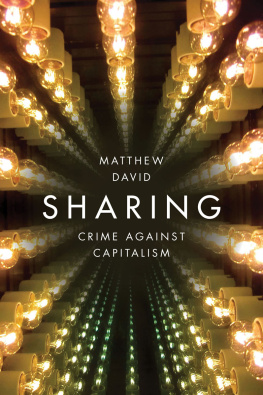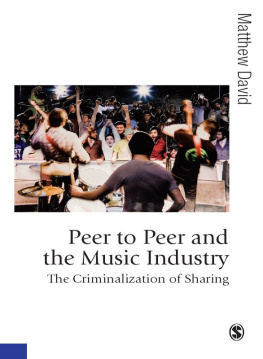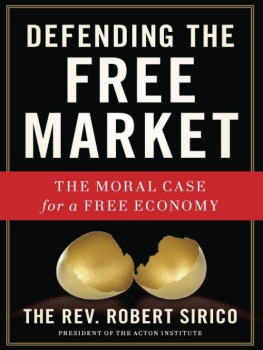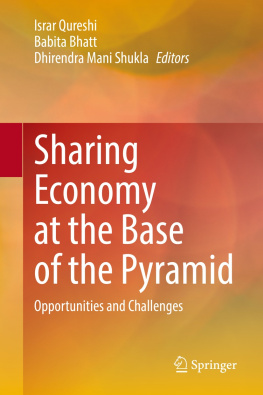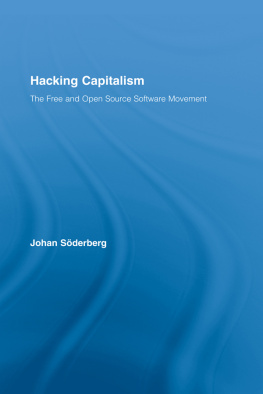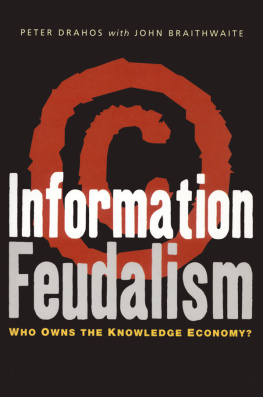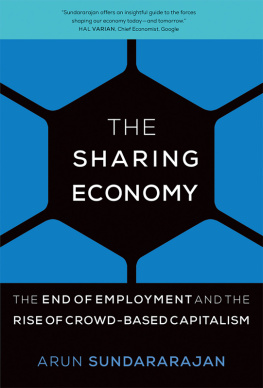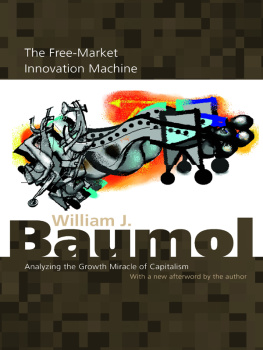Contents
Guide
Pages

To Hilda Valerie (Val) David
19392016
Sharing
Crime against Capitalism
Matthew David
polity
Copyright Matthew David 2017
The right of Matthew David to be identified as Author of this Work has been asserted in accordance with the UK Copyright, Designs and Patents Act 1988.
First published in 2017 by Polity Press
Polity Press
65 Bridge Street
Cambridge CB2 1UR, UK
Polity Press
350 Main Street
Malden, MA 02148, USA
All rights reserved. Except for the quotation of short passages for the purpose of criticism and review, no part of this publication may be reproduced, stored in a retrieval system or transmitted, in any form or by any means, electronic, mechanical, photocopying, recording or otherwise, without the prior permission of the publisher.
ISBN-13: 978-1-5095-1326-0
A catalogue record for this book is available from the British Library.
The publisher has used its best endeavours to ensure that the URLs for external websites referred to in this book are correct and active at the time of going to press. However, the publisher has no responsibility for the websites and can make no guarantee that a site will remain live or that the content is or will remain appropriate.
Every effort has been made to trace all copyright holders, but if any have been inadvertently overlooked the publisher will be pleased to include any necessary credits in any subsequent reprint or edition.
For further information on Polity, visit our website: www.politybooks.com
Acknowledgements
Thanks are due to the various coauthors whose thinking on sharing I have shared (Jack Birmingham, Debbie Halbert, Jamie Kirkhope, Andrew Kirton, Peter Millward and Natasha Whiteman); to those authors whose work I coedited (and thereby internalized) for the Sage Handbook of Intellectual Property (all fifty of you); to those who shared their wisdom in editing this and earlier works of mine on post-scarcity sharing (in particular Anna Davies, Bill Dutton, Richard Giulianotti, David Held, Julia Knight, James Milton, Eva-Maria Nag, Raphal Nowak, Chris Rojek and Andrew Whelan); to the many nameless but invaluable peer reviewers down the years; to Durham Universitys Institute of Advanced Study for hosting discussions that facilitated this work; and to those participants in discussions at Cardiff University, CUNY, SUNY, Londons City University and Queen Mary College, Oxfords Internet Institute and Department of Music, the University of Utrechts Workshop on the Sharing Economy, and Durham Universitys Caf Politique, where the ideas presented in this book were presented and critiqued. Particular thanks to Sarah Dancy, Rachel Moore, Jonathan Skerrett and Amy Williams at Polity Press for getting things into shape. Finally, I would especially like to thank all the students over the years who have taken my various cybercrime and cyberculture modules. They taught me a lot and I hope they learned something from all the free downloaded versions of my work they seemed always able to find.
Introduction
Sharing: Crime against Capitalism sets out to examine the pros and cons of property, market and sharing-based economies in terms of innovation, production and distribution of informational goods. The book will address this comparison in terms of efficiency, efficacy and incentive. By informational goods is meant books, music, computer software, visual media, journalism, academic journal articles and scientific research (including pharmaceutical research and development). In contrast to the over- and misused notion of the tragedy of the commons (Hardin 1968), which outlines how goods held in common can be overexploited and undermaintained in the absence of counterbalancing forces, but which then (erroneously) asserts that the only viable counterbalance is private property rights, my book (in line with the work of Heller 1998 and 2008) illustrates the tragedy of the anti-commons, wherein private ownership and competition inhibit the maintenance of public goods and reduce overall efficiency, efficacy and incentive. Sharing: Crime against Capitalism also highlights the superiority of a sharing-based economy in maximizing the public good and overall utility.
Free music online reduces opportunity costs (e.g., the inability to purchase one thing such as a concert ticket if one has just spent ones money on something else such as a recording), increasing spending on live performance; and when freely shared recordings boost live concert ticket sales, and, consequently, ticket prices, musicians get better paid. The Internet and World Wide Web illustrate the primacy of collaborative programming over commercial coding, and open-source networks of hackers have broken all silo-made corporate encryption. Newspapers and broadcasters draw upon freely shared content provided by digital citizen witnesses, and this has allowed them to cut costs and sack staff. Yet, such organizations are challenged by the Internet when freely shared content surpasses traditional media claims to be the ones who bring the news and, in particular, who are the first to bring it to audiences (uncensored). Academic journals are increasingly owned by commercial publishers, which profit from content produced by public science, science which is made available without charge by researchers but which is then sold back to the research community in terms of rapidly escalating journal prices. Non-commercial funding (whether in the domain of pure science or of applied science such as in pharmaceuticals) underpins the research that creates most of the value in what may later be fenced off through patent.
While only too willing to cut costs to some degree by means of using freely shared content online (or from other non-property/nonmarket-based networks such as academic science), commercial intermediaries are threatened by free distribution of content if it is too effective in reducing cost. Success in reducing cost can also reduce scarcity and, if that cannot be controlled, may then lead to a radical reduction in price (potentially to nothing). This threat (or promise depending upon how you see things) underpins the pressure for legislation to further criminalize sharing. In conditions of global network capitalism, sharing information is a crime against capitalism. Nonetheless, despite stringent efforts, such legislative strategies have been radically unsuccessful in actually containing the level and significance of sharing.
In this context, where criminalization has largely failed to prevent sharing, alternative business models have emerged. These new business strategies have attempted to compete in the spaces created by sharing as an alternative to capitalist business-as-usual. What has emerged, as this book will document, is a form of post-scarcity sharing economy. This is, at least, at the level of informational goods. In suspending intellectual property rights in practical terms (the law still formally protects IP), and in bypassing the need for markets (free-sharing is not the same as direct reciprocation in the form of exchange by barter), what emerges is something not fully capitalist. However, there still remains the potential for people to get paid and even for some people to make a profit. Yet, this is in conditions where content is open and accessible to ever greater numbers; and in many cases for nothing.
Sharing: Crime Against Capitalism?
The significance of free-sharing across global digital networks needs to be seen in the light of the emergence of global network capitalism (Castells 1996, 2009). The contradictions within global network capitalism are both the spaces in which free-sharing arose, and those that are intensified by free-sharing. The first contradiction lies in globalization itself. On the one hand, globalization extends market and property relations. Globalization has meant expanding markets by means of a deregulation of trade barriers and the integration of distribution chains within global distribution networks. Globalization has also extended property rights protection beyond national jurisdictions. This is particularly true for IP, where the harmonizing of national laws has been achieved in recent years through a combination of multi- and bilateral treaties (Yu 2015). Globalization also reduces costs through global outsourcing of production to cheaper labour markets (Chon 2015). On the other hand, globalization affords an exponential expansion in pirate, counterfeit and generic outsourcing in production and distribution (Rojek 2015).

